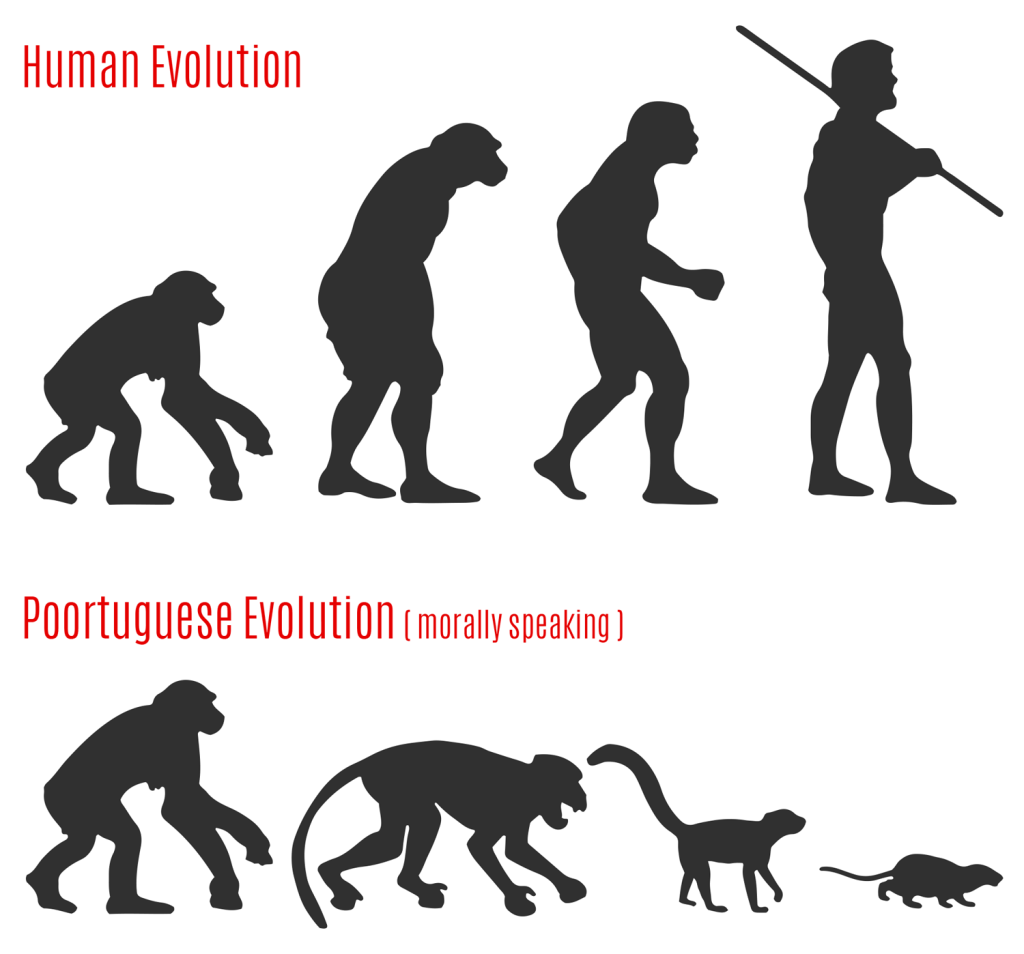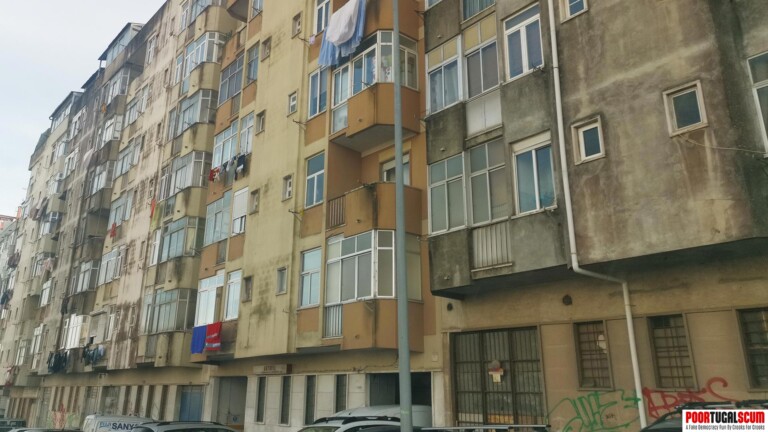This news seems like a (bad) joke, as absurd and scabrous it is, but this happened in a court in Portugal, which is the norm. What’s even more shocking, if that’s possible, is that this sentence was handed down by a female judge, who in turn followed the advice of another female prosecutor in this ultra-absurd, so criminal and humiliating sentence against the female victim.
This case is the perfect example of how Portuguese “justice” works, no matter what the case, this is the rule and not the exception, in the overwhelming majority of cases it blatantly protects the criminal and punishes the victim, through outrageous and deeply revolting sentences like this one.
Not even the fact that the judge and the public prosecutor were also women spared this abused woman from such a criminal and retarded sentence, as only in Portugal could such an aberration of a sentence be produced.
Portugal is a veritable disgusting Stone Age madhouse of very creepy “people”!
The following article is a translation (mostly MT). You can find the link to the original website at the end of it.
Psychologists alert to the contradictory message that the measure conveys: on the one hand, it brings a feeling of impunity to the aggressors; on the other hand, it can make victims desist from pressing charges. Lawyers say “not a normal solution at all”.
According to the news advanced on Friday by Correio da Manhã, the judge agreed with the position of the Public Ministry, which suggested the suspension, despite having proven the crime of offense to physical integrity, classifying it, however, of “average illegality”.
“This is everything we don’t want to happen when we resort to institutions that should protect us”, begins by telling psychologist Catarina Lucas to CNN Portugal, noting that this decision “generates a feeling of helplessness and disbelief”. “People question themselves, question whether they are doing the right thing. Victims often already have feelings of guilt and this can reinforce these wrong beliefs.”
Daniel Cotrim, psychologist, technical adviser to the APAV board since 2001, regrets that this type of situation is not unprecedented in Portugal, despite acknowledging that “there has been, in the last three, four years, greater attention to what are denouncements and victims’ rights and, above all, respect for what they say and report”.
Experts heard by CNN Portugal warn of the impact that decisions like these have not only on this alleged victim – who was allegedly attacked on February 26, 2022 -, but also on all other people who experience situations of domestic violence.
“Unfortunately, it happens more than people think. This type of decision is common,
but it used to be more common than it is now”, emphasizes Daniel Cotrim, also reinforcing the impact that this type of measure has on the feeling of guilt that the victim tends to feel and that, many times, leads to that it takes longer to file a complaint or does not file a complaint at all.
“It is as if the system that the person seeks to help them said: ‘you are the one who has to decide, because you are a victim and it is not that important’. There is a feeling of devaluation”, continues the specialist, who is also a professor at the CRIAP Institute, an establishment specializing in the field of Mental Health.
Mixed message for victims
“It’s continuing the idea that husband and wife don’t get involved”, says Daniel Cotrim, when asked what message such a measure conveys.
For Catarina Lucas, the imposition placed on the aggressor to deal with the victim is “serious” and sends a “contradictory message”: “be reconciled with your aggressor”.
“It’s as if we were looking at domestic violence as a matter between husband and wife and that is resolved with a conversation”, laments Daniel Cotrim, who points out that
“other victims will be afraid to file a complaint, they don’t understand the message of the system, the same system that tells you to get out of the violent reaction is the same one that forces you to go out to dinner and go for a walk with the aggressor”
“No, we do not have to accept violence, tolerate any kind of aggression, whether physical or psychological. And this sends a contradictory message to people who are victims of violence”, shoots Catarina Lucas. “This is, at bottom, a generalized message to victims that it is not even worth pressing charges.”
Catarina Lucas and Daniel Cotrim agree on another side effect that this measure may have: if, on the one hand, it may discourage victims of domestic violence from filing a complaint, on the other hand, it may lose the “dissuasive” effect that judicial bodies should to have.
“It can cause a feeling of impunity [in the aggressors], that nothing happens. These behaviors are not conveniently punished, there is no deterrent effect”, says Catarina Lucas.
Daniel Cotrim also says that this measure “clearly brings a feeling of impunity to all aggressors, reinforces what they say to their victims, that ‘no one will believe you’”.
Lawyer João Massano is of the same opinion, who says that “more than impunity, what worries is the social conviction that is created that, on the one hand, it is not worth the victim to go to the system because he will not defend and, on the other hand,
the idea that you can be violent at will, you buy dinner and some flowers and that’s it”.
Catarina Lucas says that, in cases of domestic violence, and especially in the face of such news, we always have to work in two ways: “by raising awareness of the victims and protecting and empowering the victim so that she can free herself and file a complaint”, but ” also from a preventive perspective with the aggressors, using legal means that have a deterrent effect.” When there are penalties of this kind, underlines the specialist, this does not happen.
“Unusual” decision that puts pressure on the victim
For João Massano, this case raises several issues that are transversal to other cases of domestic violence and that reflect a judicial fragility in relation to the subject: the willingness of third parties to reconcile (in this case, the Public Prosecutor’s Office); the inequality of legal follow-up between defendant and victim; the victim’s psychological ability (or lack thereof) to make decisions without pressure from the abuser, a decision that puts more pressure on the victim.
But let’s go by parts. In this case, “we are almost facing a family mediation”. In practice, he explains, what this decision says is that “conviction for violence does not make sense, reconciliation makes sense”.
When questioned about what is in the law that leads to a decision that requires contact between the aggressor and the victim, the lawyer states that “legally there is no reason” for this. What could be at stake, he clarifies, is that, after evaluating the case and those involved, it was considered that making peace is the solution. “Whoever sponsors the solution [Public Ministry] did it because they thought that the relationship could still be saved. So he thought: ‘let’s play cupids’”, he says ironically.
“I don’t know what the victim said, but in a general way, what seems to us is that this decision by the Public Ministry is riddled with prejudices, beliefs, ideas that the family can be restructured, that that relationship it can somehow evolve, but this comes with many quotation marks, it is as if it were a therapeutic way of wanting to remedy the situation. But justice is not meant to be therapy”, points out Daniel Cotrim.
The APAV psychologist even says that the expressions conciliation and mediation are prohibited in Portuguese law in cases of domestic violence and that, recently, “an order was issued that came to prohibit conciliation in divorce situations where there has been domestic violence”.
João Massano explains that “whoever makes this request does it because after talking to people, he decides that it is best for them”, but leaves the question: “Does this paternalism of the Public Ministry make sense? Should he be the cupid of these relationships and save the marriage?”.
The lawyer remains critical of the way some domestic violence issues are handled in court. “There was acceptance of both, but to what extent is the victim’s will clarified? Doesn’t the State have a duty to protect the victim?
On these issues of his own, João Massano once again points the finger at the way domestic violence is treated in court. “The first big problem is knowing to what extent the victim’s consent is clarified, the victim was not even accompanied by a lawyer, sometimes they say that it is better for everyone and people are not aware of what they are doing”, something that says which tends to be common in many domestic violence cases that come to court. And here the lawyer highlights a “weapons inequality” that he considers “inadmissible”:
“the accused has the right to a lawyer paid by the State if he does not have financial conditions, the victim does not have the immediate attribution of a lawyer”.
“Another issue is to know to what extent a victim of domestic violence is free to make a decision without being conditioned by the aggressor. There are cases in which the victim feels sorry for the aggressor”, he says, reinforcing the role of psychological follow-up and legal advice in these cases – which does not always happen, he regrets. The Bar Association itself issued, this Monday, a statement on the obligation of legal advice to victims of crimes of violence.
One last aspect that João Massano highlights in this measure and which, in his view, makes it even more “unusual”
is the fact that it places responsibility on the victim and the aggressor at the mercy of his will. “In view of the request, if the person [victim] does not want to go to dinner with him [the aggressor], he does not comply with the injunction” and as a consequence “there may be a higher penalty if the victim does not accept”.
“The aggressor himself is dependent on the victim to fulfill something. We are putting someone’s good behavior into something that does not depend only on him and this is absurd”, stress.
Psychologist Daniel Cotrim is of the same opinion, who considers that the measure “puts even more responsibility on the victim, this whole measure, all these aspects of this measure, place the power of guilt on the victim”.
“The issue is that if we look at the background of the complaint, it was mistreated, there was an attempt to asphyxiate and there was evidence, so it puts the responsibility of enforcing the measure on her“, he highlights.
Lawyer Cláudia Amorim classifies as “bizarre” and “very atypical” the fact that the measure puts the victim in charge of fulfilling the obligations of the defendant, however, she points out that, at the outset, it will be enough for the aggressor to show the tickets purchased to show that tried. But on the victim’s side there’s always pressure, she says.
Does the measure “discredit” the judicial system?
For lawyer Cláudia Amorim, president of the Criminal Forum – Association of Penal Lawyers, since 2022, and member of the Commission for Gender Equality and Domestic Violence of the Bar Association, this is a “unique case”, “even bizarre” and the The decision of the Public Prosecutor’s Office, taken forward by the judge, “has nothing legal about it”.
The specialist says that “this goes completely against the cycle with policies related to domestic and gender violence, it sends a message that this can be solved this way, but this is not the way to solve it”.
For the lawyer, what seems to be at stake is the desire to “finish a process before there is an accusation”. “I don’t know if the Public Prosecutor’s Office may have some understanding that this is a way of reinstating the defendant. The processes have this aspect, that the defendants are integrated into society, but it does not seem to me at all appropriate for this integration to be the victim herself”.
Cláudia Amorim says that “the acceptance” of the victim in these cases “has little meaning” due to the common risk of psychological subjugation by the aggressor.
“There was a change in the legal quality, which theoretically reduces special care for the victim, but in practice we know that this is not how it happens”, she laments.
Lawyer João Massano, despite having reached an agreement between the victim and the aggressor, as is common in cases of provisional suspension of proceedings, considers that the measure reflects a “willingness to reconcile the couple”, which, in his opinion, it is “abnormal” and “discredits” the judicial system, mainly due to the fact that “this type of measures, decisions and requests” have appeared “dry in public opinion”, with no explanation, no interpretation – and there are many points to analyze in the decision of the Public Ministry, he says. “It is the reproach of all justice.”
“Do I think it’s normal for a person who attacked another to take them to dinner? It’s weird, to say the least”, she says, reinforcing that this type of measure brings a feeling of “impunity” to aggressors.
More cautious when it comes to pointing the finger at the credibility of the judicial system is lawyer João Luz Soares, although he considers that, in this specific case, “the validity requirements of what is the provisional suspension mechanism of the process do not seem to be happy, taking into account the crime in question”. The lawyer says that “it is not a very normal solution at all”, but argues that it is necessary to evaluate a whole and not just a specific case when assessing the credibility of justice.
“It is the Public Prosecutor’s Office that determines [the provisional suspension of a process and the manner in which it happens], the judge only gives his agreement. Now, he asks me: does the judge have to accept it? No. This is where the problem lies, when the judge carries out the analysis, he has to take into account the specific case, he has to take into account the requirements of general and special prevention and, above all, he has to carry out a qualitative analysis”, explains João Luz Soares, stating that “this type of news causes perplexity, shocks those who are not within the system and our legal sensitivity”.
For Daniela Cotrim, a psychologist at APAV, “what this measure promotes, in the form in which it appears, is the idea that the court promotes the idea of conciliation through highly dubious methods”, which makes it difficult to understand.
Both João Massano and João Luz Soares see this specific case as an alert to the importance of greater judicial literacy, better communication and greater clarification, not only for public opinion, but also for the victims themselves.
“There have to be limits and, for me, the most important thing is to communicate why this is done. People may not understand it well, but [when communicating] there is a social interpretation given by the Public Ministry, by the judge, by the Superior Council of the Judiciary, there is a rationale and then we may or may not agree”, concludes João Massano.










OMG. I was reading this and I feel I found the answers I was looking for. So I am not crazy, if you know what I mean. I wish the owner of this blog keeps going with the great work of exposing THE TRUTH. I am portuguese and this blog is no more no less than that! Yes, portuguese scumbags will say otherwise. They will always treat you miserably based on their own ill behaviour, no matter what you do, if you’re a good person or not. I sent a complaint to the judiciary police in Portugal about domestic violence from my ex boyfriend. We split 11 years ago and I found out 2 years ago he was still stalking my social media, badmouthing me, creating a net of crazies like him to damage my reputation (including the worst of them – his current partner) and basically make jokes online about every single thing me or my contacts did and even touching on intimate stuff related to my private family life.
He even found my personal contacts, phone number and email and shared it with his crazies to harass me. So I now had to report everything he did during the relationship and was doing presently. As I wasn’t interested in more involvement with such person or anything related it was an anonymous complaint but where I stated my details as the victim of course. Do you want to know what the portuguese police did? They contacted me as denounced party not as the accuser. After I contacted them different times with more evidence and stating the dates, times and me as the one who presented the complaint, they kept asking me to meet them as denounced. I now had to change my email address, my home address everywhere (including on my citizen card) as if I was a criminal fugitive but for trying to get help with the police itself.
I live in the UK in shared accommodation and after I complained I had to move houses twice and I’m now near the third move because the portuguese police though AI means I don’t know keeps finding ways of removing the old housemates and replacing them with new ones that only remind me my ex, his partner, his crazies or my complaints. All this to harass me even more with stuff related to what I had complained about. To pressure me to keep complaining? This is not the legal approach. And they’re acting outside of their jurisdiction. Plus, I’m the victim. Last year I was in a state of near depression due to all the harassment. This year they managed to get rid of his partner’s cousin from the UK, at least.
A professional footballer (Was playing for the premier league, sold to guess where? Saudi). Lobbies, yes… I know it’s the portuguese police because I had told them I didn’t want to know details about some of my personal information that could help on the case. This info, only I can know about and only the police can access through the portuguese registers. And they sent me 2 housemates to remind me and harass me about it. As if I’m dealing with bad copies of everything/everyone complained or told to them about. Absolutely insane. I changed my address to a Postal Office address btw, including on English services too just in case. And had to change my Facebook profile name and remove my profile photo as well. My ex and his crazies? Keep going with their jokes and humiliating gossip that involves not only me but my parents too.
I just found out the reason the country has so many domestic violence cases is not only the fact they’re all a bunch of middle aged idiots but also the fact the police joins them without any consideration for the victims. Now I know why almost all court cases end up as suspended convictions too. Do not go to Portugal, do not interact with Portuguese scum, do not buy in Portugal! It’s a terrorist dictatorial state disguised as a democracy to steal from many, including the EU.
I am a woman who was ordered by a female judge to negotiate with a man known to be extremely violent to regain land he stole from me. My son, a doctor, testified I feared him. It made no difference. Words fail me.
What a such ignoble sentence! Judges in Portugal are almost always very friendly with crooks and have a particular pleasure in humiliating victims. Of course, these scoundrels could NEVER be judges anywhere else but in Poortugal.
These evil judges have a habit of never recognizing any crime, and the victim has to, as if, apologize to the criminal/thief if he/she does the favor of giving us back what he/she stole from us (or anything else). In any truly democratic country, probably half of the Portuguese judges (and others) would be imprisoned for corruption and serious wrongdoing and most of the others (including other important personages from the justice system) would not even be allowed to practice due to pure incapacity. This also applies to the overwhelming majority of Portuguese lawyers who are nothing more than con artists just interested in getting as much of our money as possible. Not to mention the almost totality of corrupt politicians, and so on… and so on…
It’s unbelievable, but practically the entire Portuguese population is made up of scoundrels and at the best just plain imbeciles.
I sincerely hope that you can resolve your situation, because I know it’s horrible, what you must be going through in that hellhole. In Portugal there is never any real help from anyone. It’s all rotten!